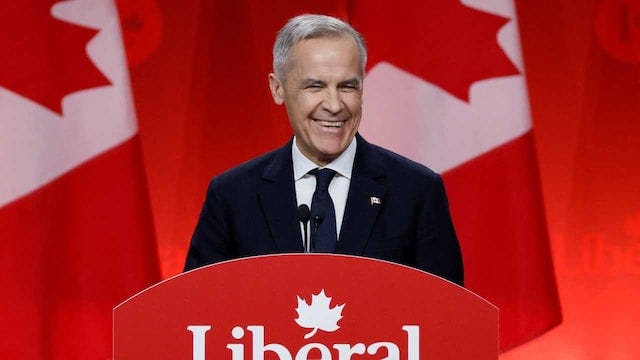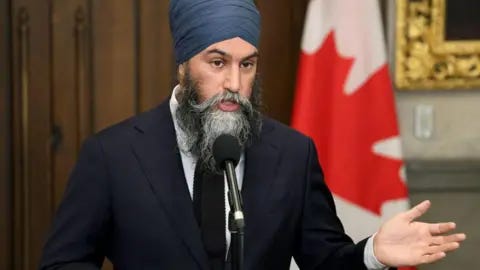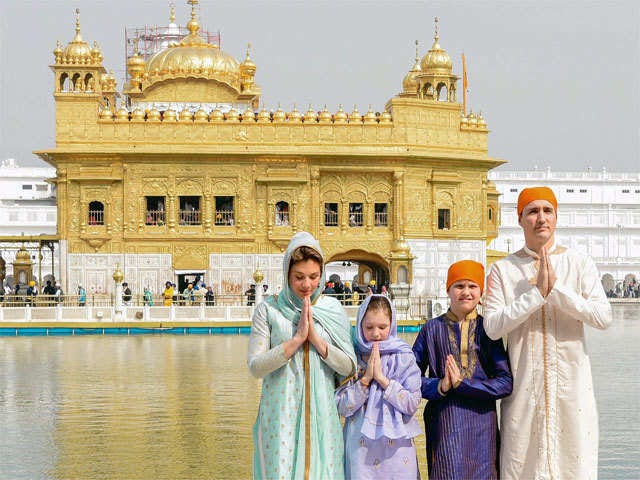Liberal Party Triumphs in Canadian Federal Election: Mark Carney to Lead as Prime Minister
PM Modi, among the first to congratulate Mark Carney, called for "further strengthening the India-Canada relationship," a message widely seen as an olive branch toward reengaging with Ottawa.

Liberal Party Triumphs in Canadian Federal Election
The Liberal Party has secured a significant victory in Canada's 2025 federal election, with Mark Carney set to become the next Prime Minister. This election, held on April 28, 2025, witnessed dramatic shifts in polling over the past few months, concluding with the Liberals surging ahead of Pierre Poilievre's Conservatives amid heightened tensions with the United States and domestic economic concerns. Results poured in by late evening, marking a stunning reversal of fortune for the Liberal Party, which had been trailing significantly in polls earlier this year following Justin Trudeau's resignation in January.
Election Results: A Detailed Breakdown
According to projections, the Liberal Party has won approximately 160 seats, positioning them to form a government in the 343-seat House of Commons. While they appear to have fallen short of the 172 seats needed for an absolute majority, they hold a comfortable lead over their main rivals. Pierre Poilievre's Conservative Party secured around 140 seats despite having led polls by up to 25 points earlier in the year. The Bloc Québécois maintained a significant presence with 22 seats, continuing to represent Quebec's interests in federal politics.
The New Democratic Party (NDP) suffered a devastating defeat, winning only about 7 seats—a dramatic decline from their previous position that threatens their status as an officially recognized party, which requires a minimum of 12 seats. The Green Party managed to secure just one seat, maintaining their minimal presence in Parliament.
Voter turnout was substantial, with approximately 7.3 million Canadians participating in advance polling alone, according to Elections Canada. The election, which many analysts described as the most significant in recent memory, saw Canadians responding strongly to both domestic issues and international pressures.

Jagmeet Singh's Defeat and Resignation
In one of the election's most notable outcomes, NDP Leader Jagmeet Singh not only saw his party's representation collapse but also lost his own seat in Burnaby Central. Singh, who had served as NDP leader since 2017, conceded defeat on Monday night after trailing in third place behind both Liberal newcomer Wade Chang and Conservative candidate James Yan.
"It's been the honour of my life to represent the people of Burnaby Central. Tonight they chose a new member of parliament, and tonight I wish them well as they continue to work hard for this community," Singh said in his concession speech. He announced his intention to step down as party leader once an interim replacement had been selected.
The defeat marks a dramatic fall for Singh, who had previously won his riding with more than 40% of the vote in the 2021 election. Under his leadership, the NDP had secured significant policy concessions from Trudeau's minority government through a confidence and supply agreement signed in 2022, which delivered programs such as pharmacare and dental care for low-income Canadians.
Trudeau's Legacy and the Liberal Turnaround
Justin Trudeau's nearly decade-long tenure as Prime Minister ended with his January 2025 resignation amid historically low approval ratings. Throughout his final years in office, Trudeau faced growing public dissatisfaction, with his disapproval rating almost twice his approval rating during both the 2019 and 2021 elections, which he nevertheless won.
Trudeau's government faced mounting criticism over several key issues, particularly its immigration policies. In November 2024, Trudeau himself acknowledged that his administration had made "mistakes" in immigration policy that allowed "bad actors like fake colleges and large corporations" to exploit the system. This admission came as his government announced plans to reduce immigration targets for the next three years, a significant policy shift for the Liberal Party.
The former Prime Minister kept a notably low profile during the 2025 election campaign following his resignation, which analysts suggest may have actually helped the Liberal Party's chances by allowing voters to focus on new leadership rather than past controversies. By the time Trudeau stepped down, the Conservatives were leading in polls by approximately 20 points, making the Liberal comeback all the more remarkable.
Trump's Influence: How U.S. Rhetoric Reshaped Canadian Politics
Perhaps the most unexpected factor in the election was the profound impact of U.S. President Donald Trump's statements and policies toward Canada. Trump's threats to annex Canada and his imposition of tariffs sparked a surge of patriotism that dramatically shifted the electoral landscape.
According to a POLITICO/Focaldata poll, three-quarters of Canadians expressed negative views of Trump, with his favorability rating at minus 61. About 39% of voters identified Trump as a top concern in the election, second only to cost of living issues at 60%. Most strikingly, approximately half of Canadians now consider the U.S. a hostile power—a dramatic reversal in sentiment toward their closest ally.
This anti-Trump sentiment directly benefited the Liberals, who had positioned Carney as the leader best equipped to handle diplomatic and economic tensions with the United States. In one particularly provocative statement that galvanized Canadian voters, Trump reiterated in a Time magazine interview his desire to annex Canada, stating: "The only way this thing really works is for Canada to become a state."
Mark Carney: From Central Banking to Prime Minister
Mark Carney, the 60-year-old former central banker who took over Liberal leadership from Trudeau in March 2025, represents a significant departure from his predecessor. His background in economics and finance provided immediate credibility during a campaign dominated by economic concerns and international tensions.
Prior to entering politics, Carney built an impressive international reputation as Governor of both the Bank of Canada and the Bank of England—the first person to head two major central banks. His expertise in economic management became a central campaign theme, with Carney arguing that his financial background made him uniquely qualified to navigate Canada through turbulent economic waters and confrontations with the Trump administration.
Polling data consistently showed Carney with net positive favorability ratings throughout the campaign—a sharp contrast to both his predecessor Trudeau and his Conservative opponent Poilievre. Interestingly, Carney managed to maintain relatively strong cross-partisan appeal, with 65% of Conservative voters expressing an unfavorable view of him compared to 74% of Liberal voters who disliked Poilievre.
The final YouGov MRP projection before election day suggested the Liberals would win between 162 and 204 seats, with a central estimate of 185—accurately predicting the general outcome if slightly overestimating the final numbers.
India-Canada Relations: A Potential Reset on the Horizon
Prime Minister Narendra Modi was among the first world leaders to congratulate Mark Carney on the Liberal Party’s victory, tweeting, “Congratulations @MarkJCarney on your party’s success in the Canadian federal elections. I look forward to working together to further strengthen the India-Canada relationship based on mutual respect and shared democratic values.” His swift message was widely interpreted as an olive branch, signaling New Delhi’s openness to reengaging with Ottawa after a prolonged period of diplomatic frost.
The election results may indeed mark the beginning of a much-needed reset in India-Canada relations, which had deteriorated sharply under Justin Trudeau’s leadership. Tensions between the two countries reached a crisis point in 2024, following Trudeau's public allegations implicating Indian agents in the killing of “Khalistani” figure Hardeep Singh Nijjar on Canadian soil. India vehemently denied the accusations, calling them "absurd and politically motivated," and subsequently suspended visa services for Canadian citizens, further worsening ties.
Another major irritant was the Canadian government’s perceived tolerance of pro-Khalistan activity within its borders. New Delhi repeatedly expressed concern that extremist elements were exploiting Canada’s liberal democratic freedoms to foment anti-India sentiment and sow discord in Punjab. Trudeau’s reluctance to firmly curb such activities drew sharp criticism from Indian officials and media alike.
Jagmeet Singh’s defeat in Burnaby Central—and his subsequent resignation as NDP leader—was viewed in many Indian circles as a significant development. Singh had often been labeled in Indian media as "a known pro-Khalistan figure, who repeatedly accused India of being involved in the death of Khalistani terrorist Hardeep Singh Nijjar." His departure from political leadership removes a prominent voice that had openly clashed with Indian interests, potentially clearing the way for a less confrontational bilateral tone.
With Mark Carney assuming office, there is cautious optimism that his government will adopt a more pragmatic, less ideologically driven approach to India. Carney's background in international diplomacy and economic policy suggests he may be better equipped to rebuild trust and restore cooperation across key areas—trade, immigration, and higher education—where both nations share substantial interests.
For the sizable Indian diaspora in Canada, including the large Punjabi community, this transition in leadership could prove consequential. Many have long called for a more balanced and respectful engagement between the two democracies. If Carney’s administration can combine diplomatic tact with a clear stance against extremism, it could not only thaw relations but also unlock new avenues for bilateral collaboration.
Punjabi Perspectives and Future Outlook
For the substantial Punjabi community in Canada—whether on student visas, permanent residency, or citizenship—the election outcome holds particular significance. The community has long maintained deep connections to Punjab and broader India, with many having significant interests in the long-term stability of Indo-Canadian relations.
There is cautious optimism that Carney's government might approach bilateral issues with pragmatism, potentially easing tensions that have affected travel, immigration, and business relationships between the two countries. The substantial Punjabi-Canadian population represents an important constituency that could benefit from improved diplomatic ties, particularly regarding visa processing, educational opportunities, and business investments.
Looking Ahead: A New Chapter in Canadian Politics
The 2025 Canadian federal election represents a dramatic turning point in the country's political landscape. The Liberal victory under Mark Carney's leadership, coming after months of trailing in polls, demonstrates how quickly electoral fortunes can change when international pressures and economic concerns converge.
As Carney prepares to form his government, he faces significant challenges: managing relations with a hostile U.S. administration, addressing persistent economic concerns including inflation and housing affordability, reforming immigration policies, and potentially repairing strained international relationships including with India.
The election also marks the end of several political chapters—Justin Trudeau's Liberal legacy, Jagmeet Singh's leadership of the NDP, and potentially the Conservative strategy of populist messaging under Poilievre. In their place, a new era of Canadian politics begins, shaped by economic expertise, diplomatic challenges, and a renewed sense of Canadian national identity forged partly in response to external pressures.
PM Trudeau's Irresponsible Remarks about India
A Misguided Stance: PM Trudeau's Remarks and the Sovereignty of India




